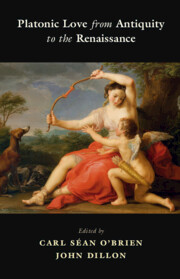Book contents
- Platonic Love from Antiquity to the Renaissance
- Platonic Love from Antiquity to the Renaissance
- Copyright page
- Contents
- Acknowledgements
- Notes on Contributors
- Introduction
- Part I Love in Plato
- Part II Development of Platonic Love in Antiquity
- Chapter 5 Plutarch
- Chapter 6 Love in Plotinus’ Thought
- Chapter 7 A Platonist ‘Ars Amatoria’
- Chapter 8 Desire and Love in Augustine
- Part III Love and Metaphysics during the Middle Ages
- Part IV Platonic Love during the Renaissance
- Bibliography
- Subject Index
- Index Locorum
Chapter 7 - A Platonist ‘Ars Amatoria’
from Part II - Development of Platonic Love in Antiquity
Published online by Cambridge University Press: 25 August 2022
- Platonic Love from Antiquity to the Renaissance
- Platonic Love from Antiquity to the Renaissance
- Copyright page
- Contents
- Acknowledgements
- Notes on Contributors
- Introduction
- Part I Love in Plato
- Part II Development of Platonic Love in Antiquity
- Chapter 5 Plutarch
- Chapter 6 Love in Plotinus’ Thought
- Chapter 7 A Platonist ‘Ars Amatoria’
- Chapter 8 Desire and Love in Augustine
- Part III Love and Metaphysics during the Middle Ages
- Part IV Platonic Love during the Renaissance
- Bibliography
- Subject Index
- Index Locorum
Summary
Taking its start from Ovid’s Ars Amatoria, this essay explores various possible antecedents in the philosophical tradition, Platonist and Stoic. It argues for a process of formalization, in the Hellenistic era and later, of the criteria for ‘noble’, or philosophical, erotic relationships, to be derived from such dialogues as Lysis, Symposium, Phaedrus, and, not least, Alcibiades I, based on Socrates’ claim, at the end of the Phaedrus, that he possessed an erōtikē tekhnē. Such a tekhnē would have theōrēmata, and these were listed as (1) selecting a suitable love-object, or axierastos; (2) commending oneself to him; and (3) guiding him to moral and intellectual self-improvement. I suggest that Polemon, in the Old Academy, may have been instrumental in developing such a theory, but we find it formalized only much later, in the Didaskalikos of Alcinous, while further information is forthcoming from the Platonic commentaries of Hermeias (on the Phaedrus) and Proclus (on the Alcibiades). I argue that the Alcibiades seems to assume a more central role than the other dialogues in later Platonist theory, and acknowledge the important role of the Stoics in its formalization.
- Type
- Chapter
- Information
- Platonic Love from Antiquity to the Renaissance , pp. 125 - 132Publisher: Cambridge University PressPrint publication year: 2022



